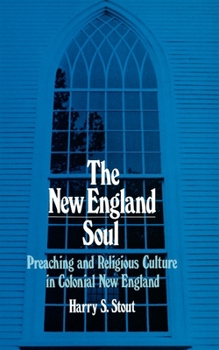New England Soul: Preaching and Religious Cultures in Colonial New England
Select Format
Select Condition 
Book Overview
The New England Soul is the first comprehensive analysis of preaching in New England from the founding of the Puritan colonies to the outbreak of the Revolution. Using a multi-disciplinary approach--including analysis of rhetorical style and concept of identity and community--Stout examines more than two thousand sermons spanning five generations of ministers, including such giants of the pulpit as John Cotton, Thomas Shepard, Increase and Cotton...
Format:Paperback
Language:English
ISBN:0195056450
ISBN13:9780195056457
Release Date:September 1988
Publisher:Oxford University Press, USA
Length:416 Pages
Weight:0.90 lbs.
Dimensions:1.1" x 5.0" x 8.1"
Customer Reviews
3 ratings
A great book by a brilliant historian
Published by Thriftbooks.com User , 20 years ago
This is a great book by a brilliant historian who is deeply revered on both sides of the Atlantic. It will be the definitive work. Christopher Catherwood, author of CHRISTIANS, MUSLIMS AND ISLAMIC RAGE (Zondervan, 2003)
Definitive work on Congregationalism
Published by Thriftbooks.com User , 23 years ago
This is a much more thorough study of Congregational culture and doctrine than that of Perry Miller. Miller's work relied entirely on published weekday sermons. Stout mined the unpublished sermon notes of hundreds of New England preachers to find a balance that Miller missed. Stout convincingly shows that the ministers' commitment to the salvation of their listeners was always paramount, and finds a consistency in their messages that link the ministers of the 1630's with those of the 1770's. Stout finds few doctrinal differences between Old Lights such as John Cotton and New Lights such as Jonathan Edwards. It's a tough read (being intellectual history), but it's well worth the effort if you wish to get inside the Puritan mind.
A must-read in colonial American history and culture
Published by Thriftbooks.com User , 23 years ago
Harry S. Stout (Ph.D., Kent State University) is currently a professor of American religious history at Yale University. Building on the groundbreaking work of Perry Miller, Stout published The New England Soul in 1986. The study is more extensive than its paperback size might suggest. The main body of the work covers nearly 150,000 words and is supplemented by 68 pages of extensive end notes. The work has become a standard text for college and graduate courses in colonial American history. Stout's work centers on the content, role, and power of the sermon in Puritan (later New England) America from the first landings to the beginning of the American revolution. His thesis, which is strongly supported through the work, is that the sermon was the central agent in creating a cohesive culture that evolves toward eventual self-identity and independence. Drawing extensively on primary sources, Stout brings to the contemporary reader the piety and passions of the people whose culture forms the soil for the American nation. Stout follows the sermon through five generations of New England preachers. These generations are marked by gradual but significant changes in the style and, to some degree, content of the sermon. These five generations he labels invention (1620-1665), arrangement (1666-1700), style (1701-1730), delivery (1731-1763), and memory (1764-1776). These five stages are, he admits, not dramatic shifts as much as a continual evolution. Through these stages Stout demonstrates changes in style (from plain to "Anglican") and, to some degree, in content. He asserts, however, that the essential core elements of the sermon remain consistent, and that the changes reflect the sermon's adjustment to a changing environment. In this assertion Stout challenges to common suggestion that Puritan preaching displaced its original mission and passion over time. The themes of personal piety and liberty, Stout demonstrates, are constant from the early sermons of John Cotton to sermons like that of Samuel West celebrating the liberation of Boston by George Washington in 1776. These themes are linked by a shared sense of cultural and religious destiny, the "city set on a hill" mission, in which American New England would fulfill the goal of Calvin's Geneva to create the perfect society in which the Kingdom of God might be fully realized on earth. The New England preacher, more so than the statesman or soldier, was the preeminent power and power-broker in the Colonial period. The sermon was both soteriological and political, reflecting a conceptual marriage of church and state difficult for the contemporary reader to fully grasp. One great value of Stout's work is, following in the steps of Perry Miller, he brings to the reader the words of voices long forgotten. While John Cotton, Cotton Mather, Jonathan Edwards, and a handful of other divines have remained well known figures, at least to students of early Amer




